Analyzing the Impact of Life Course Stages on Health and Well-being
VerifiedAdded on 2023/01/19
|9
|2733
|66
Report
AI Summary
This report provides a comprehensive overview of the influence of the life course on health and well-being. It begins by defining the life course approach and its relevance to public health, emphasizing the interconnectedness of socio-economic and individual contexts. The report then delves into the four key stages of life: childhood, adolescence, adulthood, and old age, highlighting health considerations specific to each, such as maternal and newborn health, child and adolescent health, sexual and reproductive health, and healthy aging. Furthermore, it explores the interplay of nature, nurture, diversity, and culture across these life stages, examining factors like education, genetics, and environmental influences. The report then discusses health promotion opportunities at different stages, including behavioral change, medical interventions, client-centered approaches, societal change, and educational strategies. Finally, it underscores the importance of ethical principles, such as autonomy and justice, in health promotion and public health practices, ensuring fair and equitable healthcare delivery.
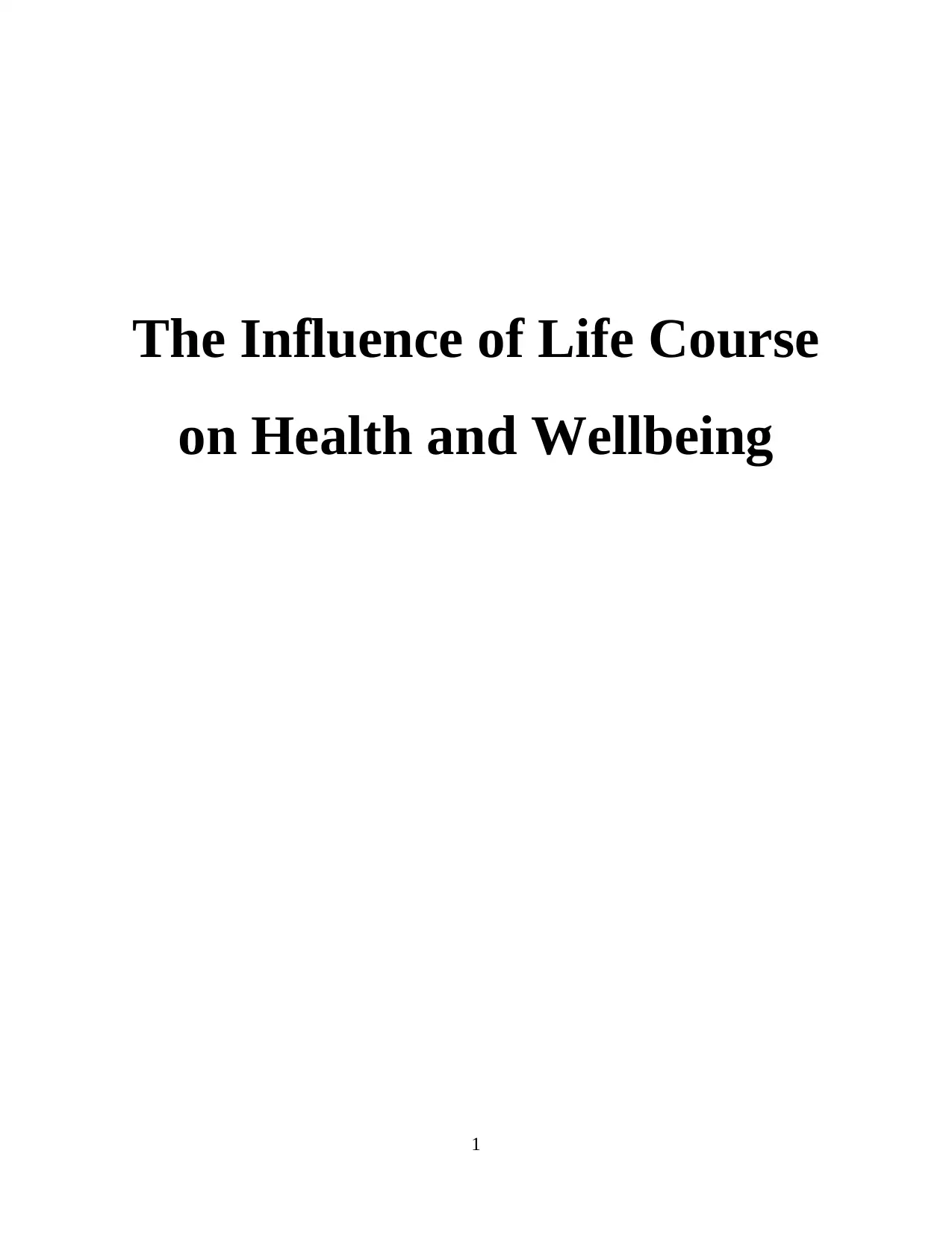
The Influence of Life Course
on Health and Wellbeing
1
on Health and Wellbeing
1
Paraphrase This Document
Need a fresh take? Get an instant paraphrase of this document with our AI Paraphraser
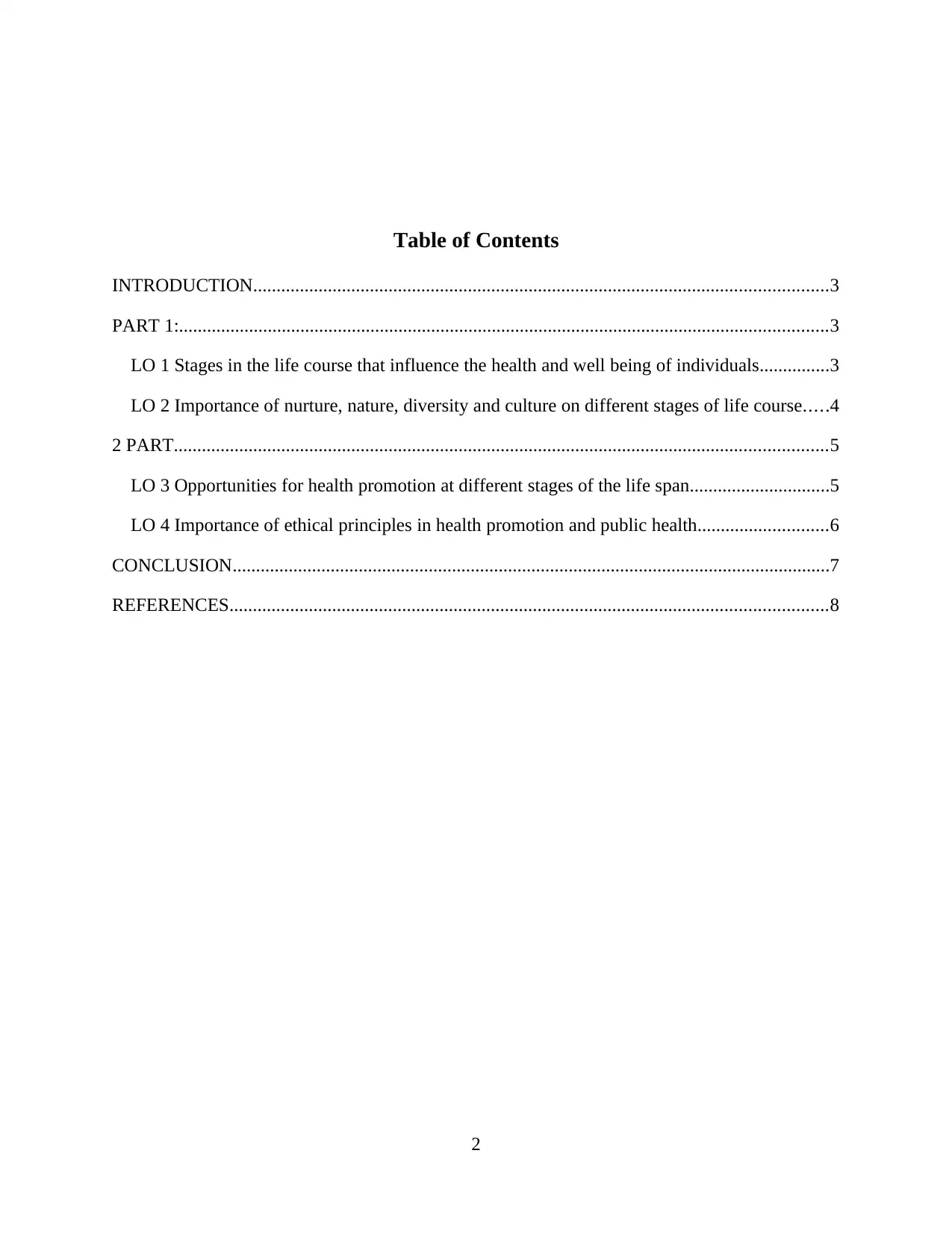
Table of Contents
INTRODUCTION...........................................................................................................................3
PART 1:...........................................................................................................................................3
LO 1 Stages in the life course that influence the health and well being of individuals...............3
LO 2 Importance of nurture, nature, diversity and culture on different stages of life course.....4
2 PART............................................................................................................................................5
LO 3 Opportunities for health promotion at different stages of the life span..............................5
LO 4 Importance of ethical principles in health promotion and public health............................6
CONCLUSION................................................................................................................................7
REFERENCES................................................................................................................................8
2
INTRODUCTION...........................................................................................................................3
PART 1:...........................................................................................................................................3
LO 1 Stages in the life course that influence the health and well being of individuals...............3
LO 2 Importance of nurture, nature, diversity and culture on different stages of life course.....4
2 PART............................................................................................................................................5
LO 3 Opportunities for health promotion at different stages of the life span..............................5
LO 4 Importance of ethical principles in health promotion and public health............................6
CONCLUSION................................................................................................................................7
REFERENCES................................................................................................................................8
2
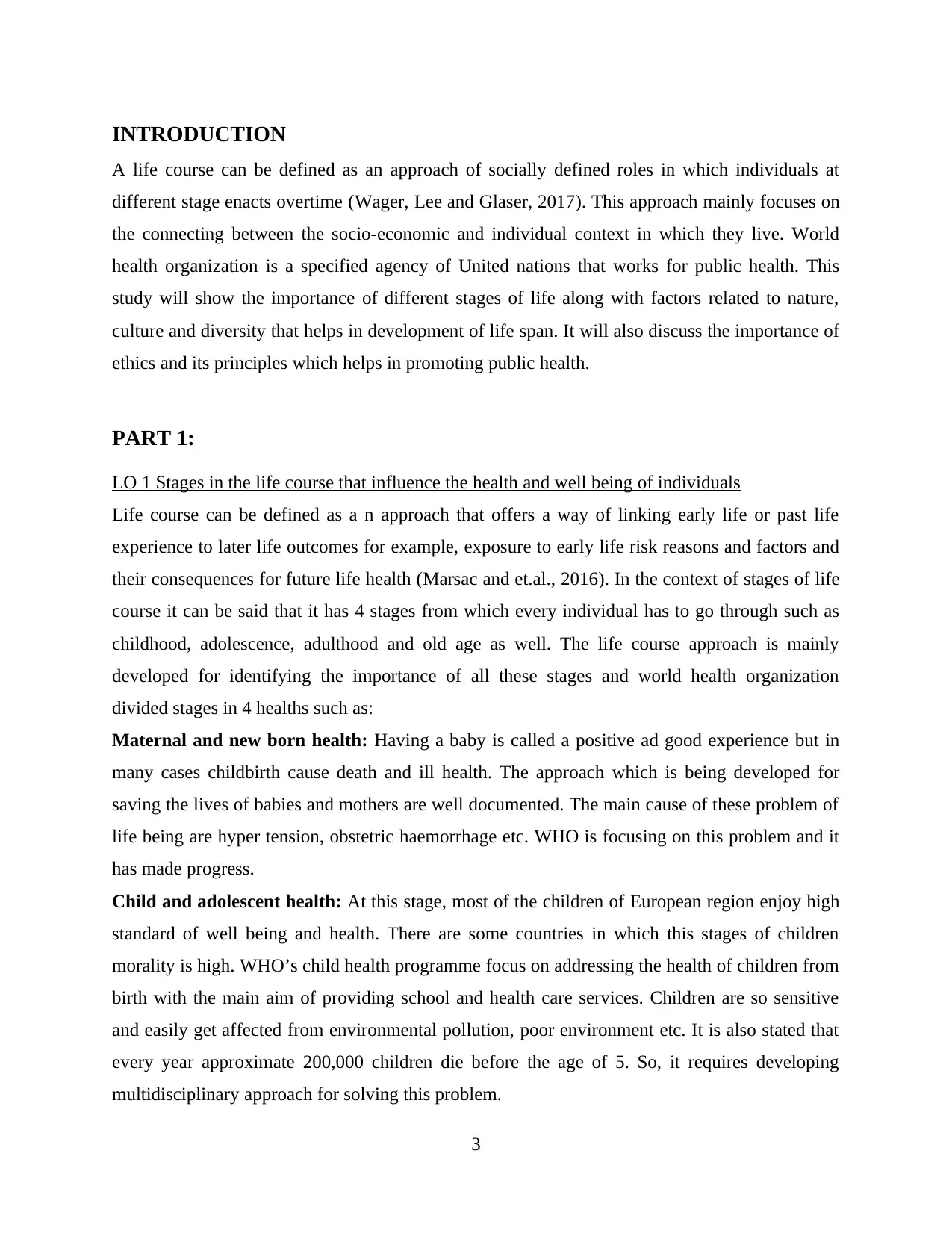
INTRODUCTION
A life course can be defined as an approach of socially defined roles in which individuals at
different stage enacts overtime (Wager, Lee and Glaser, 2017). This approach mainly focuses on
the connecting between the socio-economic and individual context in which they live. World
health organization is a specified agency of United nations that works for public health. This
study will show the importance of different stages of life along with factors related to nature,
culture and diversity that helps in development of life span. It will also discuss the importance of
ethics and its principles which helps in promoting public health.
PART 1:
LO 1 Stages in the life course that influence the health and well being of individuals
Life course can be defined as a n approach that offers a way of linking early life or past life
experience to later life outcomes for example, exposure to early life risk reasons and factors and
their consequences for future life health (Marsac and et.al., 2016). In the context of stages of life
course it can be said that it has 4 stages from which every individual has to go through such as
childhood, adolescence, adulthood and old age as well. The life course approach is mainly
developed for identifying the importance of all these stages and world health organization
divided stages in 4 healths such as:
Maternal and new born health: Having a baby is called a positive ad good experience but in
many cases childbirth cause death and ill health. The approach which is being developed for
saving the lives of babies and mothers are well documented. The main cause of these problem of
life being are hyper tension, obstetric haemorrhage etc. WHO is focusing on this problem and it
has made progress.
Child and adolescent health: At this stage, most of the children of European region enjoy high
standard of well being and health. There are some countries in which this stages of children
morality is high. WHO’s child health programme focus on addressing the health of children from
birth with the main aim of providing school and health care services. Children are so sensitive
and easily get affected from environmental pollution, poor environment etc. It is also stated that
every year approximate 200,000 children die before the age of 5. So, it requires developing
multidisciplinary approach for solving this problem.
3
A life course can be defined as an approach of socially defined roles in which individuals at
different stage enacts overtime (Wager, Lee and Glaser, 2017). This approach mainly focuses on
the connecting between the socio-economic and individual context in which they live. World
health organization is a specified agency of United nations that works for public health. This
study will show the importance of different stages of life along with factors related to nature,
culture and diversity that helps in development of life span. It will also discuss the importance of
ethics and its principles which helps in promoting public health.
PART 1:
LO 1 Stages in the life course that influence the health and well being of individuals
Life course can be defined as a n approach that offers a way of linking early life or past life
experience to later life outcomes for example, exposure to early life risk reasons and factors and
their consequences for future life health (Marsac and et.al., 2016). In the context of stages of life
course it can be said that it has 4 stages from which every individual has to go through such as
childhood, adolescence, adulthood and old age as well. The life course approach is mainly
developed for identifying the importance of all these stages and world health organization
divided stages in 4 healths such as:
Maternal and new born health: Having a baby is called a positive ad good experience but in
many cases childbirth cause death and ill health. The approach which is being developed for
saving the lives of babies and mothers are well documented. The main cause of these problem of
life being are hyper tension, obstetric haemorrhage etc. WHO is focusing on this problem and it
has made progress.
Child and adolescent health: At this stage, most of the children of European region enjoy high
standard of well being and health. There are some countries in which this stages of children
morality is high. WHO’s child health programme focus on addressing the health of children from
birth with the main aim of providing school and health care services. Children are so sensitive
and easily get affected from environmental pollution, poor environment etc. It is also stated that
every year approximate 200,000 children die before the age of 5. So, it requires developing
multidisciplinary approach for solving this problem.
3
⊘ This is a preview!⊘
Do you want full access?
Subscribe today to unlock all pages.

Trusted by 1+ million students worldwide
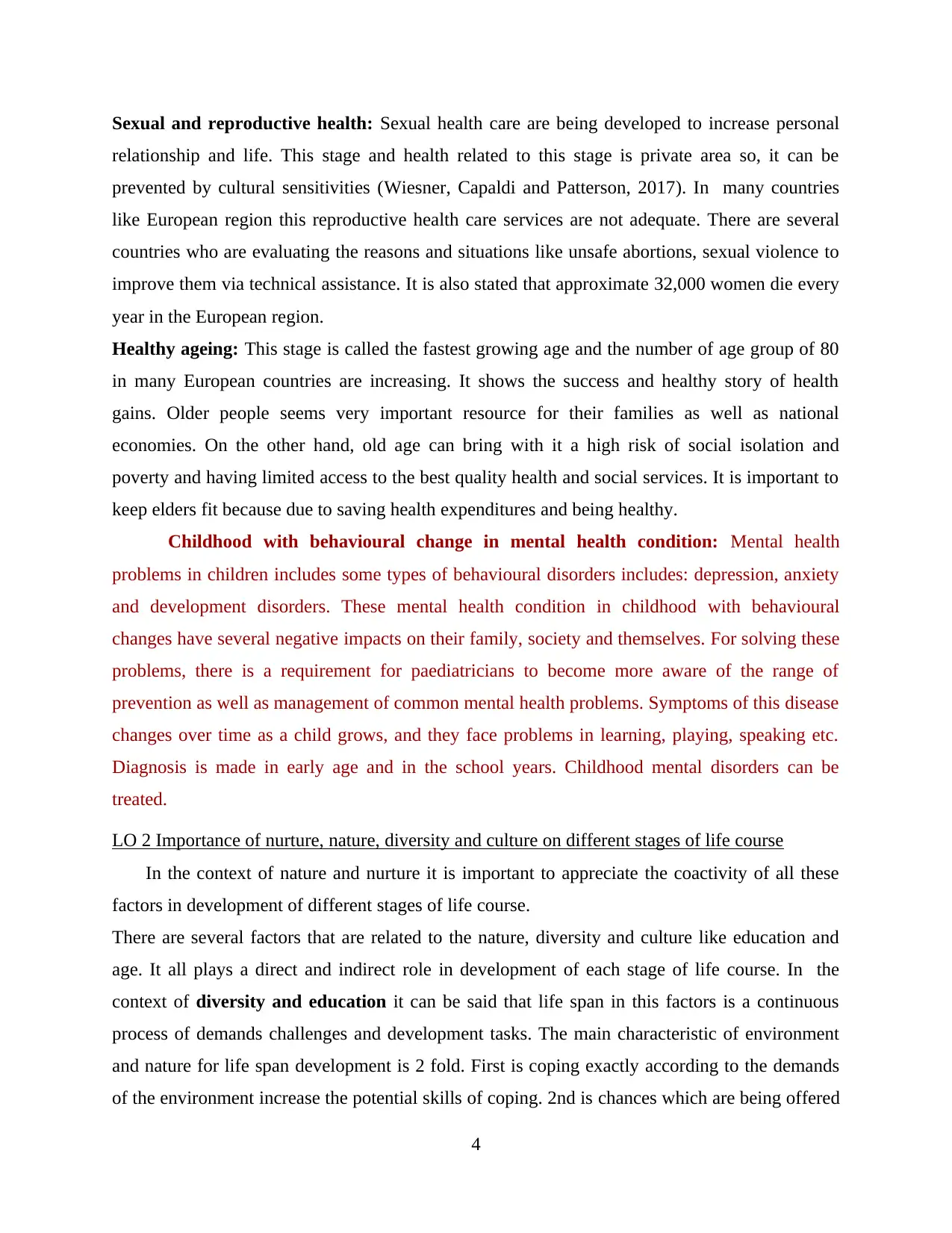
Sexual and reproductive health: Sexual health care are being developed to increase personal
relationship and life. This stage and health related to this stage is private area so, it can be
prevented by cultural sensitivities (Wiesner, Capaldi and Patterson, 2017). In many countries
like European region this reproductive health care services are not adequate. There are several
countries who are evaluating the reasons and situations like unsafe abortions, sexual violence to
improve them via technical assistance. It is also stated that approximate 32,000 women die every
year in the European region.
Healthy ageing: This stage is called the fastest growing age and the number of age group of 80
in many European countries are increasing. It shows the success and healthy story of health
gains. Older people seems very important resource for their families as well as national
economies. On the other hand, old age can bring with it a high risk of social isolation and
poverty and having limited access to the best quality health and social services. It is important to
keep elders fit because due to saving health expenditures and being healthy.
Childhood with behavioural change in mental health condition: Mental health
problems in children includes some types of behavioural disorders includes: depression, anxiety
and development disorders. These mental health condition in childhood with behavioural
changes have several negative impacts on their family, society and themselves. For solving these
problems, there is a requirement for paediatricians to become more aware of the range of
prevention as well as management of common mental health problems. Symptoms of this disease
changes over time as a child grows, and they face problems in learning, playing, speaking etc.
Diagnosis is made in early age and in the school years. Childhood mental disorders can be
treated.
LO 2 Importance of nurture, nature, diversity and culture on different stages of life course
In the context of nature and nurture it is important to appreciate the coactivity of all these
factors in development of different stages of life course.
There are several factors that are related to the nature, diversity and culture like education and
age. It all plays a direct and indirect role in development of each stage of life course. In the
context of diversity and education it can be said that life span in this factors is a continuous
process of demands challenges and development tasks. The main characteristic of environment
and nature for life span development is 2 fold. First is coping exactly according to the demands
of the environment increase the potential skills of coping. 2nd is chances which are being offered
4
relationship and life. This stage and health related to this stage is private area so, it can be
prevented by cultural sensitivities (Wiesner, Capaldi and Patterson, 2017). In many countries
like European region this reproductive health care services are not adequate. There are several
countries who are evaluating the reasons and situations like unsafe abortions, sexual violence to
improve them via technical assistance. It is also stated that approximate 32,000 women die every
year in the European region.
Healthy ageing: This stage is called the fastest growing age and the number of age group of 80
in many European countries are increasing. It shows the success and healthy story of health
gains. Older people seems very important resource for their families as well as national
economies. On the other hand, old age can bring with it a high risk of social isolation and
poverty and having limited access to the best quality health and social services. It is important to
keep elders fit because due to saving health expenditures and being healthy.
Childhood with behavioural change in mental health condition: Mental health
problems in children includes some types of behavioural disorders includes: depression, anxiety
and development disorders. These mental health condition in childhood with behavioural
changes have several negative impacts on their family, society and themselves. For solving these
problems, there is a requirement for paediatricians to become more aware of the range of
prevention as well as management of common mental health problems. Symptoms of this disease
changes over time as a child grows, and they face problems in learning, playing, speaking etc.
Diagnosis is made in early age and in the school years. Childhood mental disorders can be
treated.
LO 2 Importance of nurture, nature, diversity and culture on different stages of life course
In the context of nature and nurture it is important to appreciate the coactivity of all these
factors in development of different stages of life course.
There are several factors that are related to the nature, diversity and culture like education and
age. It all plays a direct and indirect role in development of each stage of life course. In the
context of diversity and education it can be said that life span in this factors is a continuous
process of demands challenges and development tasks. The main characteristic of environment
and nature for life span development is 2 fold. First is coping exactly according to the demands
of the environment increase the potential skills of coping. 2nd is chances which are being offered
4
Paraphrase This Document
Need a fresh take? Get an instant paraphrase of this document with our AI Paraphraser
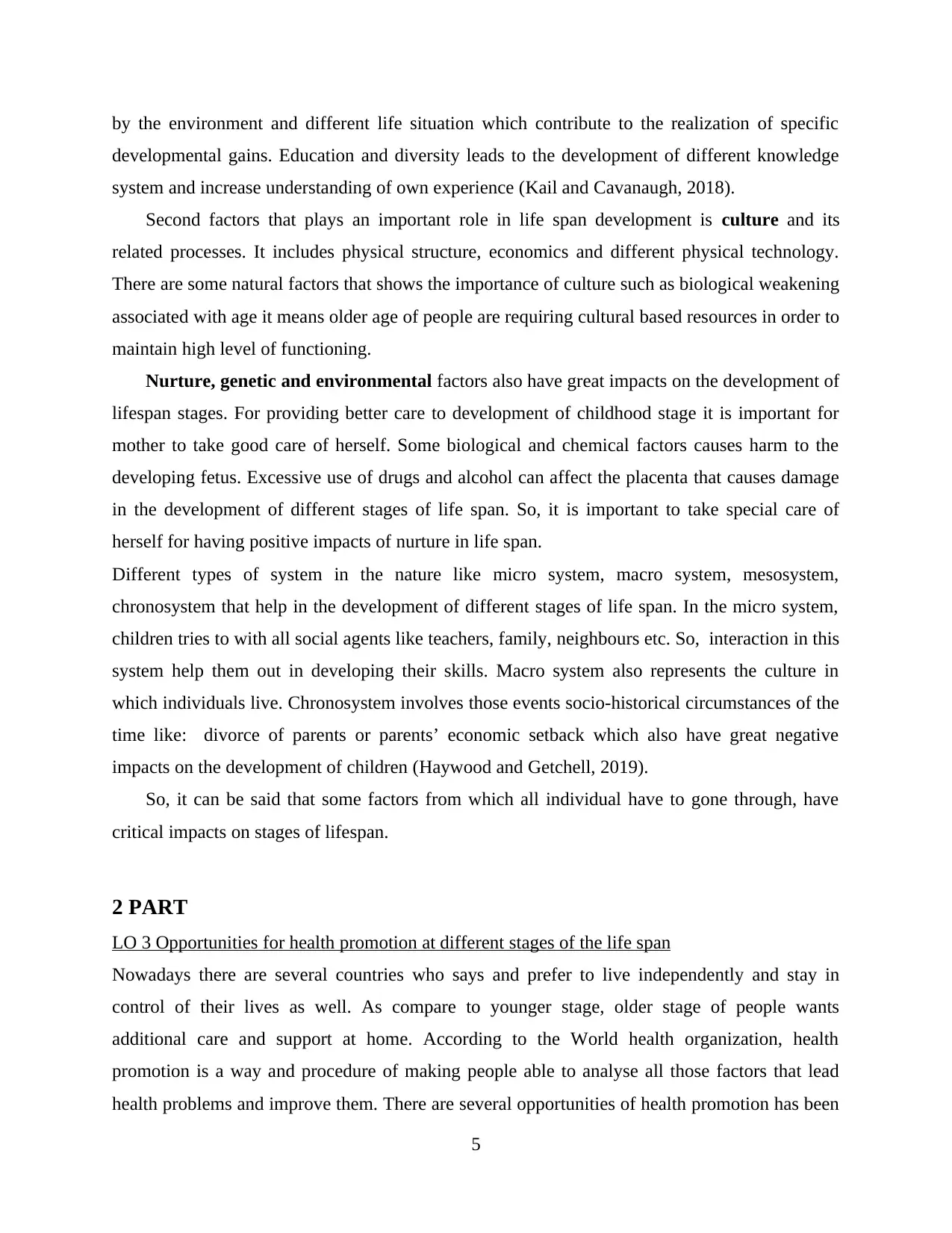
by the environment and different life situation which contribute to the realization of specific
developmental gains. Education and diversity leads to the development of different knowledge
system and increase understanding of own experience (Kail and Cavanaugh, 2018).
Second factors that plays an important role in life span development is culture and its
related processes. It includes physical structure, economics and different physical technology.
There are some natural factors that shows the importance of culture such as biological weakening
associated with age it means older age of people are requiring cultural based resources in order to
maintain high level of functioning.
Nurture, genetic and environmental factors also have great impacts on the development of
lifespan stages. For providing better care to development of childhood stage it is important for
mother to take good care of herself. Some biological and chemical factors causes harm to the
developing fetus. Excessive use of drugs and alcohol can affect the placenta that causes damage
in the development of different stages of life span. So, it is important to take special care of
herself for having positive impacts of nurture in life span.
Different types of system in the nature like micro system, macro system, mesosystem,
chronosystem that help in the development of different stages of life span. In the micro system,
children tries to with all social agents like teachers, family, neighbours etc. So, interaction in this
system help them out in developing their skills. Macro system also represents the culture in
which individuals live. Chronosystem involves those events socio-historical circumstances of the
time like: divorce of parents or parents’ economic setback which also have great negative
impacts on the development of children (Haywood and Getchell, 2019).
So, it can be said that some factors from which all individual have to gone through, have
critical impacts on stages of lifespan.
2 PART
LO 3 Opportunities for health promotion at different stages of the life span
Nowadays there are several countries who says and prefer to live independently and stay in
control of their lives as well. As compare to younger stage, older stage of people wants
additional care and support at home. According to the World health organization, health
promotion is a way and procedure of making people able to analyse all those factors that lead
health problems and improve them. There are several opportunities of health promotion has been
5
developmental gains. Education and diversity leads to the development of different knowledge
system and increase understanding of own experience (Kail and Cavanaugh, 2018).
Second factors that plays an important role in life span development is culture and its
related processes. It includes physical structure, economics and different physical technology.
There are some natural factors that shows the importance of culture such as biological weakening
associated with age it means older age of people are requiring cultural based resources in order to
maintain high level of functioning.
Nurture, genetic and environmental factors also have great impacts on the development of
lifespan stages. For providing better care to development of childhood stage it is important for
mother to take good care of herself. Some biological and chemical factors causes harm to the
developing fetus. Excessive use of drugs and alcohol can affect the placenta that causes damage
in the development of different stages of life span. So, it is important to take special care of
herself for having positive impacts of nurture in life span.
Different types of system in the nature like micro system, macro system, mesosystem,
chronosystem that help in the development of different stages of life span. In the micro system,
children tries to with all social agents like teachers, family, neighbours etc. So, interaction in this
system help them out in developing their skills. Macro system also represents the culture in
which individuals live. Chronosystem involves those events socio-historical circumstances of the
time like: divorce of parents or parents’ economic setback which also have great negative
impacts on the development of children (Haywood and Getchell, 2019).
So, it can be said that some factors from which all individual have to gone through, have
critical impacts on stages of lifespan.
2 PART
LO 3 Opportunities for health promotion at different stages of the life span
Nowadays there are several countries who says and prefer to live independently and stay in
control of their lives as well. As compare to younger stage, older stage of people wants
additional care and support at home. According to the World health organization, health
promotion is a way and procedure of making people able to analyse all those factors that lead
health problems and improve them. There are several opportunities of health promotion has been
5
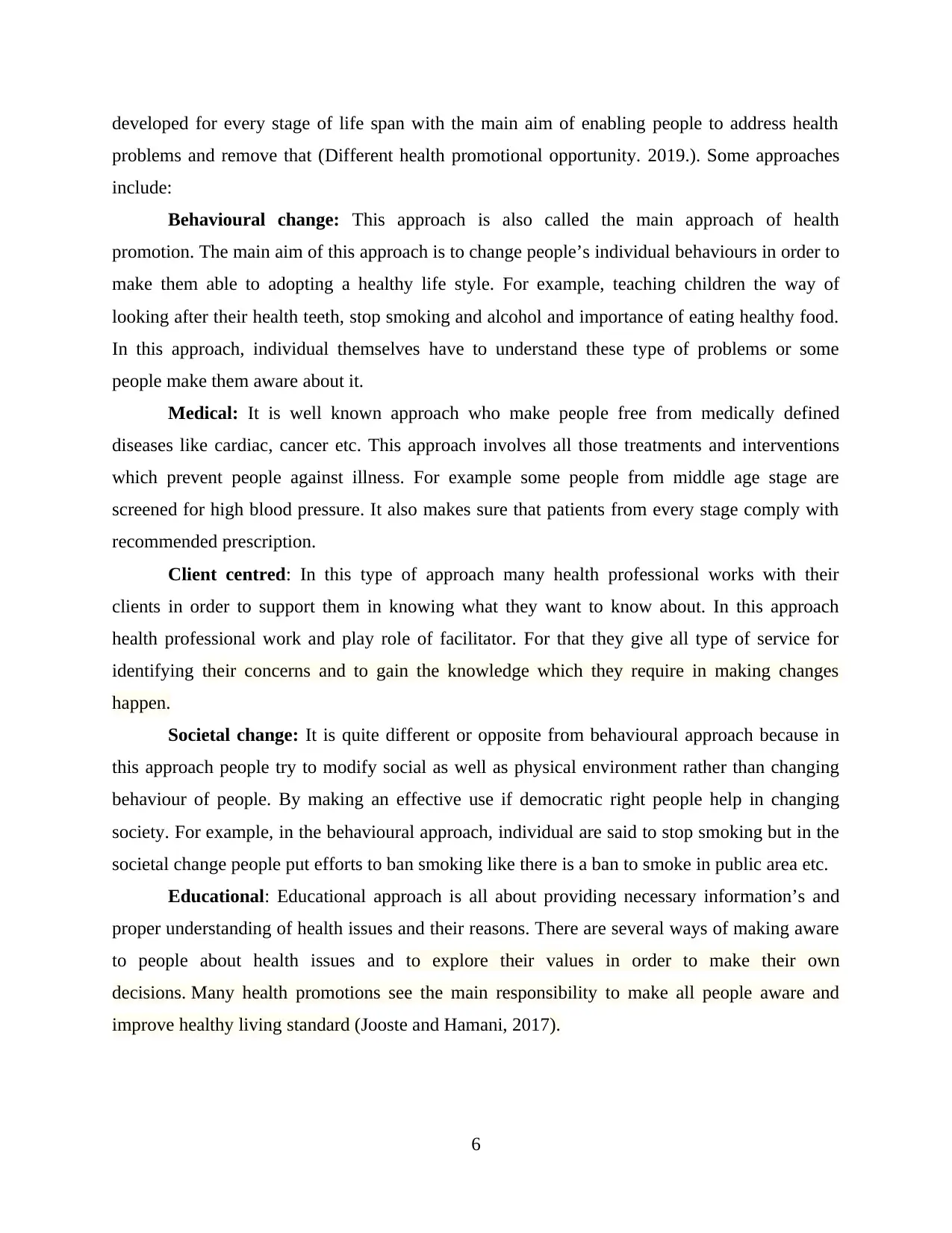
developed for every stage of life span with the main aim of enabling people to address health
problems and remove that (Different health promotional opportunity. 2019.). Some approaches
include:
Behavioural change: This approach is also called the main approach of health
promotion. The main aim of this approach is to change people’s individual behaviours in order to
make them able to adopting a healthy life style. For example, teaching children the way of
looking after their health teeth, stop smoking and alcohol and importance of eating healthy food.
In this approach, individual themselves have to understand these type of problems or some
people make them aware about it.
Medical: It is well known approach who make people free from medically defined
diseases like cardiac, cancer etc. This approach involves all those treatments and interventions
which prevent people against illness. For example some people from middle age stage are
screened for high blood pressure. It also makes sure that patients from every stage comply with
recommended prescription.
Client centred: In this type of approach many health professional works with their
clients in order to support them in knowing what they want to know about. In this approach
health professional work and play role of facilitator. For that they give all type of service for
identifying their concerns and to gain the knowledge which they require in making changes
happen.
Societal change: It is quite different or opposite from behavioural approach because in
this approach people try to modify social as well as physical environment rather than changing
behaviour of people. By making an effective use if democratic right people help in changing
society. For example, in the behavioural approach, individual are said to stop smoking but in the
societal change people put efforts to ban smoking like there is a ban to smoke in public area etc.
Educational: Educational approach is all about providing necessary information’s and
proper understanding of health issues and their reasons. There are several ways of making aware
to people about health issues and to explore their values in order to make their own
decisions. Many health promotions see the main responsibility to make all people aware and
improve healthy living standard (Jooste and Hamani, 2017).
6
problems and remove that (Different health promotional opportunity. 2019.). Some approaches
include:
Behavioural change: This approach is also called the main approach of health
promotion. The main aim of this approach is to change people’s individual behaviours in order to
make them able to adopting a healthy life style. For example, teaching children the way of
looking after their health teeth, stop smoking and alcohol and importance of eating healthy food.
In this approach, individual themselves have to understand these type of problems or some
people make them aware about it.
Medical: It is well known approach who make people free from medically defined
diseases like cardiac, cancer etc. This approach involves all those treatments and interventions
which prevent people against illness. For example some people from middle age stage are
screened for high blood pressure. It also makes sure that patients from every stage comply with
recommended prescription.
Client centred: In this type of approach many health professional works with their
clients in order to support them in knowing what they want to know about. In this approach
health professional work and play role of facilitator. For that they give all type of service for
identifying their concerns and to gain the knowledge which they require in making changes
happen.
Societal change: It is quite different or opposite from behavioural approach because in
this approach people try to modify social as well as physical environment rather than changing
behaviour of people. By making an effective use if democratic right people help in changing
society. For example, in the behavioural approach, individual are said to stop smoking but in the
societal change people put efforts to ban smoking like there is a ban to smoke in public area etc.
Educational: Educational approach is all about providing necessary information’s and
proper understanding of health issues and their reasons. There are several ways of making aware
to people about health issues and to explore their values in order to make their own
decisions. Many health promotions see the main responsibility to make all people aware and
improve healthy living standard (Jooste and Hamani, 2017).
6
⊘ This is a preview!⊘
Do you want full access?
Subscribe today to unlock all pages.

Trusted by 1+ million students worldwide
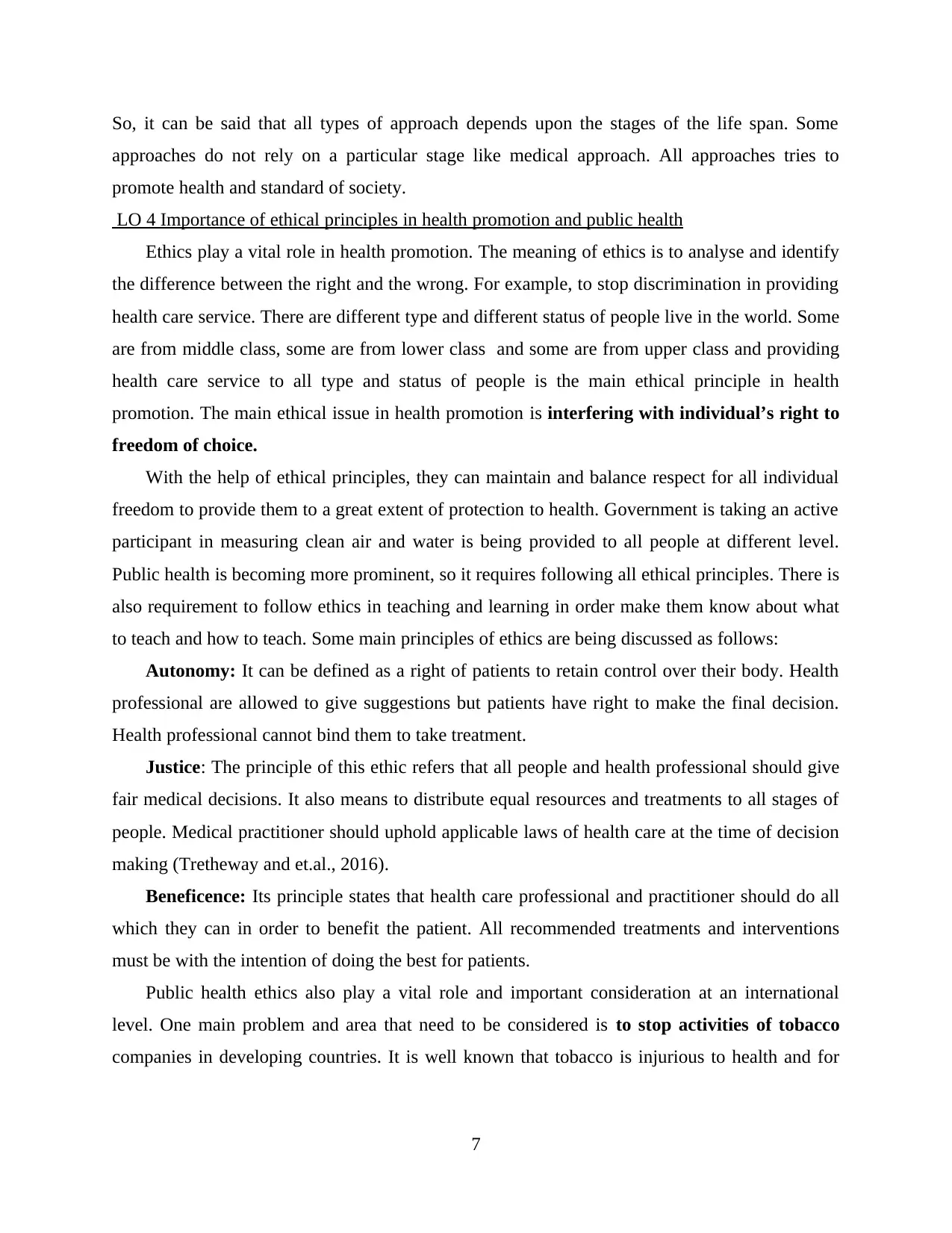
So, it can be said that all types of approach depends upon the stages of the life span. Some
approaches do not rely on a particular stage like medical approach. All approaches tries to
promote health and standard of society.
LO 4 Importance of ethical principles in health promotion and public health
Ethics play a vital role in health promotion. The meaning of ethics is to analyse and identify
the difference between the right and the wrong. For example, to stop discrimination in providing
health care service. There are different type and different status of people live in the world. Some
are from middle class, some are from lower class and some are from upper class and providing
health care service to all type and status of people is the main ethical principle in health
promotion. The main ethical issue in health promotion is interfering with individual’s right to
freedom of choice.
With the help of ethical principles, they can maintain and balance respect for all individual
freedom to provide them to a great extent of protection to health. Government is taking an active
participant in measuring clean air and water is being provided to all people at different level.
Public health is becoming more prominent, so it requires following all ethical principles. There is
also requirement to follow ethics in teaching and learning in order make them know about what
to teach and how to teach. Some main principles of ethics are being discussed as follows:
Autonomy: It can be defined as a right of patients to retain control over their body. Health
professional are allowed to give suggestions but patients have right to make the final decision.
Health professional cannot bind them to take treatment.
Justice: The principle of this ethic refers that all people and health professional should give
fair medical decisions. It also means to distribute equal resources and treatments to all stages of
people. Medical practitioner should uphold applicable laws of health care at the time of decision
making (Tretheway and et.al., 2016).
Beneficence: Its principle states that health care professional and practitioner should do all
which they can in order to benefit the patient. All recommended treatments and interventions
must be with the intention of doing the best for patients.
Public health ethics also play a vital role and important consideration at an international
level. One main problem and area that need to be considered is to stop activities of tobacco
companies in developing countries. It is well known that tobacco is injurious to health and for
7
approaches do not rely on a particular stage like medical approach. All approaches tries to
promote health and standard of society.
LO 4 Importance of ethical principles in health promotion and public health
Ethics play a vital role in health promotion. The meaning of ethics is to analyse and identify
the difference between the right and the wrong. For example, to stop discrimination in providing
health care service. There are different type and different status of people live in the world. Some
are from middle class, some are from lower class and some are from upper class and providing
health care service to all type and status of people is the main ethical principle in health
promotion. The main ethical issue in health promotion is interfering with individual’s right to
freedom of choice.
With the help of ethical principles, they can maintain and balance respect for all individual
freedom to provide them to a great extent of protection to health. Government is taking an active
participant in measuring clean air and water is being provided to all people at different level.
Public health is becoming more prominent, so it requires following all ethical principles. There is
also requirement to follow ethics in teaching and learning in order make them know about what
to teach and how to teach. Some main principles of ethics are being discussed as follows:
Autonomy: It can be defined as a right of patients to retain control over their body. Health
professional are allowed to give suggestions but patients have right to make the final decision.
Health professional cannot bind them to take treatment.
Justice: The principle of this ethic refers that all people and health professional should give
fair medical decisions. It also means to distribute equal resources and treatments to all stages of
people. Medical practitioner should uphold applicable laws of health care at the time of decision
making (Tretheway and et.al., 2016).
Beneficence: Its principle states that health care professional and practitioner should do all
which they can in order to benefit the patient. All recommended treatments and interventions
must be with the intention of doing the best for patients.
Public health ethics also play a vital role and important consideration at an international
level. One main problem and area that need to be considered is to stop activities of tobacco
companies in developing countries. It is well known that tobacco is injurious to health and for
7
Paraphrase This Document
Need a fresh take? Get an instant paraphrase of this document with our AI Paraphraser
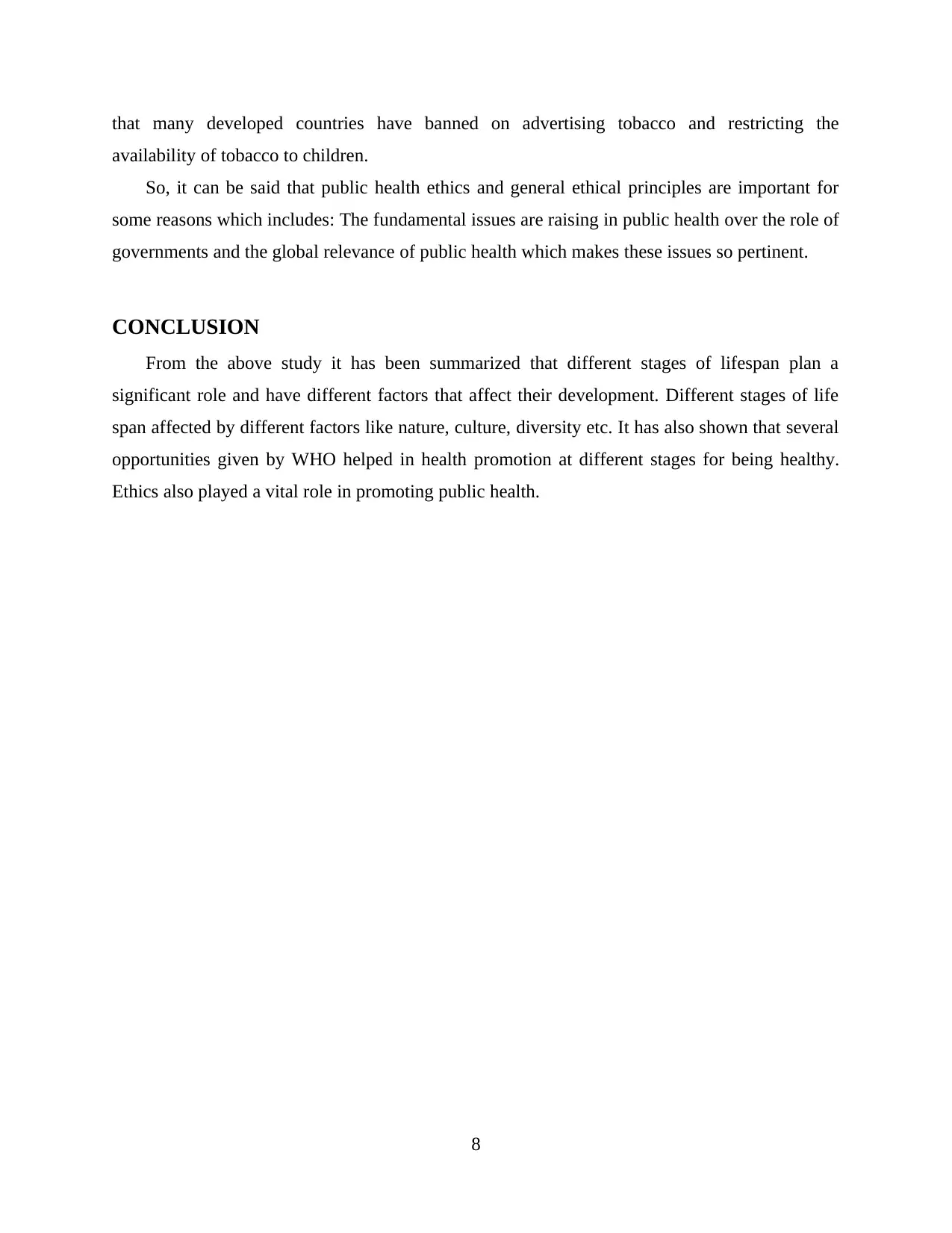
that many developed countries have banned on advertising tobacco and restricting the
availability of tobacco to children.
So, it can be said that public health ethics and general ethical principles are important for
some reasons which includes: The fundamental issues are raising in public health over the role of
governments and the global relevance of public health which makes these issues so pertinent.
CONCLUSION
From the above study it has been summarized that different stages of lifespan plan a
significant role and have different factors that affect their development. Different stages of life
span affected by different factors like nature, culture, diversity etc. It has also shown that several
opportunities given by WHO helped in health promotion at different stages for being healthy.
Ethics also played a vital role in promoting public health.
8
availability of tobacco to children.
So, it can be said that public health ethics and general ethical principles are important for
some reasons which includes: The fundamental issues are raising in public health over the role of
governments and the global relevance of public health which makes these issues so pertinent.
CONCLUSION
From the above study it has been summarized that different stages of lifespan plan a
significant role and have different factors that affect their development. Different stages of life
span affected by different factors like nature, culture, diversity etc. It has also shown that several
opportunities given by WHO helped in health promotion at different stages for being healthy.
Ethics also played a vital role in promoting public health.
8
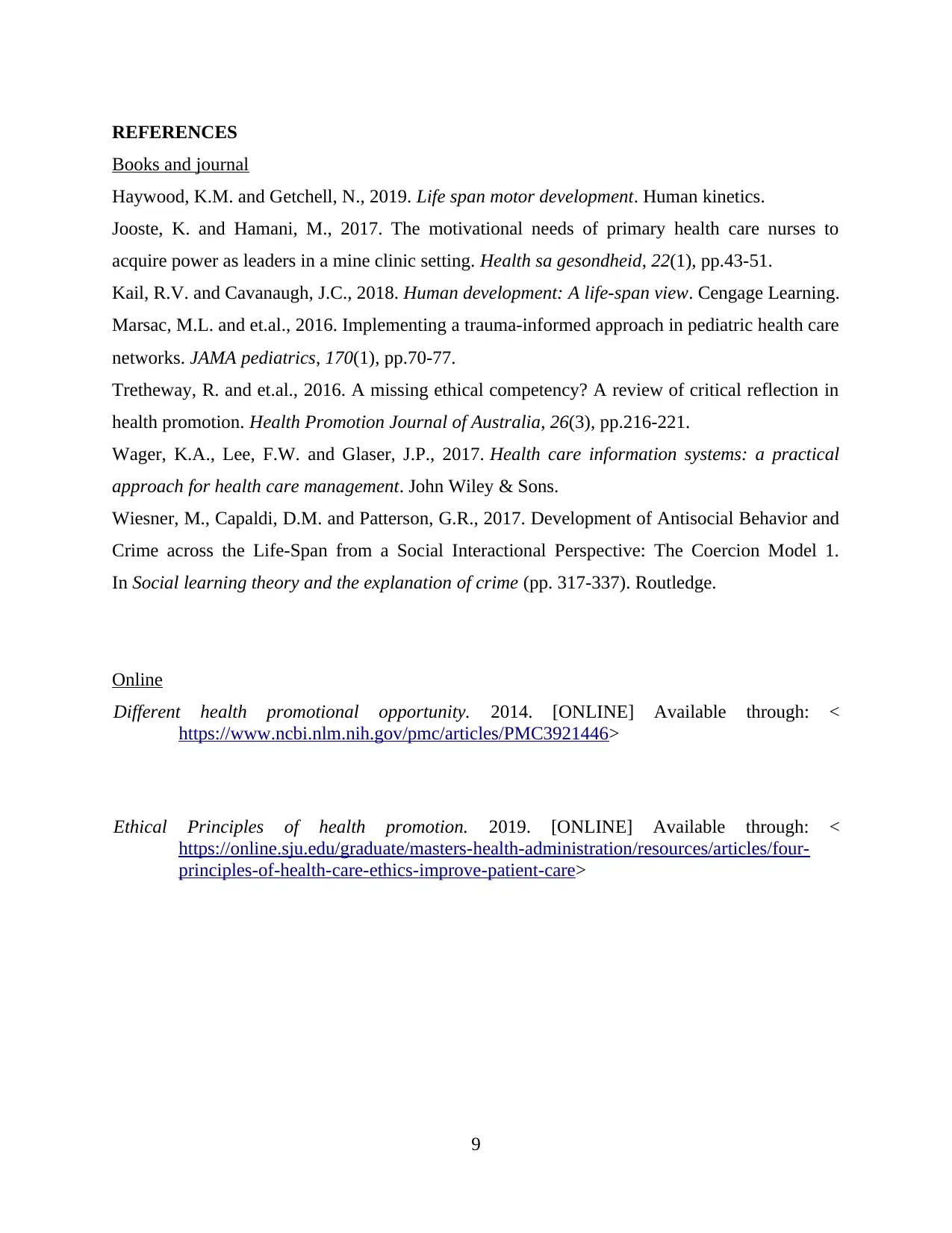
REFERENCES
Books and journal
Haywood, K.M. and Getchell, N., 2019. Life span motor development. Human kinetics.
Jooste, K. and Hamani, M., 2017. The motivational needs of primary health care nurses to
acquire power as leaders in a mine clinic setting. Health sa gesondheid, 22(1), pp.43-51.
Kail, R.V. and Cavanaugh, J.C., 2018. Human development: A life-span view. Cengage Learning.
Marsac, M.L. and et.al., 2016. Implementing a trauma-informed approach in pediatric health care
networks. JAMA pediatrics, 170(1), pp.70-77.
Tretheway, R. and et.al., 2016. A missing ethical competency? A review of critical reflection in
health promotion. Health Promotion Journal of Australia, 26(3), pp.216-221.
Wager, K.A., Lee, F.W. and Glaser, J.P., 2017. Health care information systems: a practical
approach for health care management. John Wiley & Sons.
Wiesner, M., Capaldi, D.M. and Patterson, G.R., 2017. Development of Antisocial Behavior and
Crime across the Life-Span from a Social Interactional Perspective: The Coercion Model 1.
In Social learning theory and the explanation of crime (pp. 317-337). Routledge.
Online
Different health promotional opportunity. 2014. [ONLINE] Available through: <
https://www.ncbi.nlm.nih.gov/pmc/articles/PMC3921446>
Ethical Principles of health promotion. 2019. [ONLINE] Available through: <
https://online.sju.edu/graduate/masters-health-administration/resources/articles/four-
principles-of-health-care-ethics-improve-patient-care>
9
Books and journal
Haywood, K.M. and Getchell, N., 2019. Life span motor development. Human kinetics.
Jooste, K. and Hamani, M., 2017. The motivational needs of primary health care nurses to
acquire power as leaders in a mine clinic setting. Health sa gesondheid, 22(1), pp.43-51.
Kail, R.V. and Cavanaugh, J.C., 2018. Human development: A life-span view. Cengage Learning.
Marsac, M.L. and et.al., 2016. Implementing a trauma-informed approach in pediatric health care
networks. JAMA pediatrics, 170(1), pp.70-77.
Tretheway, R. and et.al., 2016. A missing ethical competency? A review of critical reflection in
health promotion. Health Promotion Journal of Australia, 26(3), pp.216-221.
Wager, K.A., Lee, F.W. and Glaser, J.P., 2017. Health care information systems: a practical
approach for health care management. John Wiley & Sons.
Wiesner, M., Capaldi, D.M. and Patterson, G.R., 2017. Development of Antisocial Behavior and
Crime across the Life-Span from a Social Interactional Perspective: The Coercion Model 1.
In Social learning theory and the explanation of crime (pp. 317-337). Routledge.
Online
Different health promotional opportunity. 2014. [ONLINE] Available through: <
https://www.ncbi.nlm.nih.gov/pmc/articles/PMC3921446>
Ethical Principles of health promotion. 2019. [ONLINE] Available through: <
https://online.sju.edu/graduate/masters-health-administration/resources/articles/four-
principles-of-health-care-ethics-improve-patient-care>
9
⊘ This is a preview!⊘
Do you want full access?
Subscribe today to unlock all pages.

Trusted by 1+ million students worldwide
1 out of 9
Related Documents
Your All-in-One AI-Powered Toolkit for Academic Success.
+13062052269
info@desklib.com
Available 24*7 on WhatsApp / Email
![[object Object]](/_next/static/media/star-bottom.7253800d.svg)
Unlock your academic potential
Copyright © 2020–2026 A2Z Services. All Rights Reserved. Developed and managed by ZUCOL.





